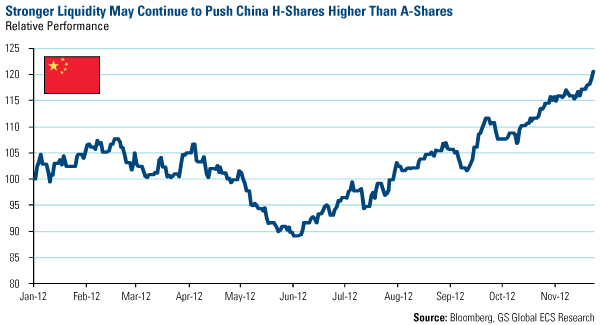Emerging Markets Radar (December 3, 2012)
Strengths
- China’s National Development and Reform Commission (NDRC) approved new metro rail and railway projects amounting to Rmb 160 billion in November, after approving metro rail projects of Rmb 843 billion in September. Those projects will be able to support fixed asset investment growth for the years to follow. China’s premier-in-waiting Li Keqiang said yesterday that his government’s priorities going forward will be urbanization and modernization of infrastructure which will drive GDP and the construction, materials, property and consumptions sectors.
- The Philippines’ third-quarter GDP growth was far stronger than expected, up 7.1 percent versus expected 5.4 percent. Both supply and demand sides have seen robust growth in the economy. The market has raised GDP expectation for 2013. From an equity market standpoint, the strong GDP growth underpins corporate profit growth, and will be supportive of banks, properties, and consumptions.
- Thailand’s manufacturing production index (MPI) for October rose 36 percent year-over-year and 5.4 percent month-over-month, supported by production in domestic-related sectors, especially food and beverage, cement, and construction materials.
- China’s industrial companies’ profits surged 20 percent to 500.1 billion yuan in October, versus 7.8 percent growth in September. Although for the year 2012, industrial profit growth was negative on a year-over-year basis, that trend has reversed recently.
Weaknesses
- Thailand’s October current account was in a deficit of $199 million, versus consensus positive $700 million and previous month $1.77 billion.
- Korea’s October industrial production fell 0.8 percent year-over-year after growing 1 percent in September, due to weak service industry production. Retail sales declined by 0.8 percent month-over-month in October, while facility investments fell by 2.9 percent month-over-month.
- China’s brokerage names fell in the week as China’s A-shares market were weak and rumors abound that the regulators might reduce trading commissions to boost domestic stock trading volume.
- Hong Kong’s October exports fell 2.8 percent, reversing the gains made in September and August. Net exports will be a drag on GDP growth in the fourth quarter as they were in the third quarter.
- Brazil’s real tumbled to a three-year low after a report showed the economy grew only 0.9 percent in the third quarter, only half the pace that economists forecast.
Opportunities

- The chart above shows the price outperformance of MSCI China (H shares listed in Hong Kong) relative to CSI300 (domestically listed A shares). Encouraged by China’s GDP growth recovery and the third round of quantitative easing in the U.S., net money has been flowing to H-shares since September this year.
- Goldman Sachs and Citigroup predicted Chinese stocks will rally next year as the nation’s new leaders introduce measures to bolster the world’s second-largest economy.
- Urbanization in Thailand and planned high speed projects will drive up demand in construction and consumption in rural areas.
Threats
- The Shanghai SE Composite Index dropped below 2000, a psychological threshold, this week, a 45-month low, due to liquidity dry-up and lack of enthusiasm in the economic recovery. The market is now debating whether the benchmark is a leading or a lagging indicator, which is related to its predictive power for commodity demand and China’s GDP growth. In addition, China will have Rmb 180.9 billion in equities ending a lock-up period in December, Southwest Securities says. This will further pressure the domestic stock prices.
- Jakarta increased minimum wage by 44 percent, which may induce other provinces to follow. While the increase benefits consumption and property, it should be negative to labor-intensive sectors and those sectors that don’t have pricing power. It is obviously a cost-increasing factor for banks and agricultural producers.
- Speaking at a banking forum in London, Sberbank’s deputy CEO defined Russian economic policy as “incoherent” and contributing to economic slowdown. “The potential growth from stimulating consumption has absolutely been exhausted,” she said. And any additional efforts to drive up spending by households “could lead to a bubble.”











